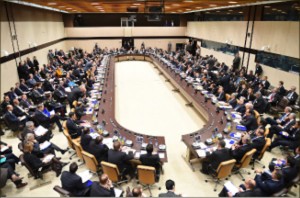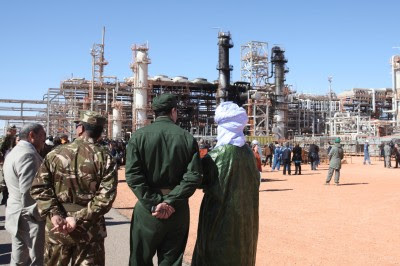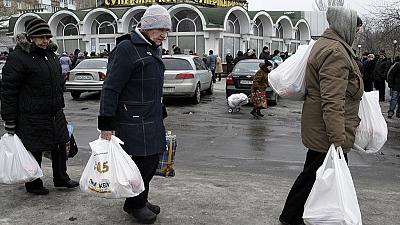By Bakari Gueye in Nouakchott
for Magharebia

Ministers and delegates of the 60-member coalition trying to crush the Islamic State (ISIS) meet at the NATO headquarters in Brussels on December 3, 2014
High-level delegations from dozens of countries will reconvene in the Maghreb next week to work out a plan to defeat the Islamic State.
Representatives of 60 countries will gather in Marrakech on Monday (December 15th) to discuss ways to counter the Islamic State (ISIS) terror group.
The news was announced at the first meeting of the international coalition in Brussels on December 3rd, where members agreed on a joint strategy going forward.
In their closing statement, the coalition partners reaffirmed their “commitment to work together under a common, multi-faceted and long-term strategy to degrade and defeat ISIS”.
The discussions included a review of progress made on the ground and the efforts required to defeat Daesh.
The coalition agreed that efforts should focus on five components: “supporting military operations, stopping the flow of foreign fighters, cutting off access to financing, addressing humanitarian relief and delegitimising ISIS”.
The campaign against Daesh was “beginning to show results”, the Brussels forum noted. But the fight would be long, attendees said, and would require a sustained, concerted and co-ordinated response.
Several countries, including Morocco and Tunisia, are already co-operating in a large-scale operation called “Ghost Hunt” to track down and capture Daesh fighters.
According to Moroccan daily Al Massae, a unit from the Directorate-General for Land Surveillance (DGST) was overseeing the operation.
“There are reports of security co-operation between Morocco and Algeria to track down and dismantle ISIS cells. Moroccan officials from the DGST will be involved in the operation,” Moroccan daily Al Massae reported on August 25th.
“The fight against terrorism cannot succeed without close co-operation between countries that are potential targets for terrorist organisations,” it said.
The advance of Daesh is worrying all countries in the Maghreb, chief among them Morocco.
On October 25th, a new security mechanism called “Hadar” was implemented in the kingdom. The aim of Hadar is to “tackle the various threats that the country faces” and to boost “the protection of citizens and foreign visitors”, according to the interior ministry.
At the Brussels meeting, the coalition members expressed their determination to implement United Nations Security Council provisions, tackle the influx of foreign terrorist fighters, cut off financing for Daesh and other terrorist groups, and expose their ideology of violence.
“ISIS’s terrorists are a scourge. Everything must be done to eradicate it,” French Foreign Minister Laurent Fabius said. “The coalition’s military action is beginning to bear fruit, especially in Iraq, but there is still a lot of work to do.”
According to analyst Daha Ould Sidi Ali, “This rallying of the international community against radicalism is vital because ISIS has now become the largest jihadist force in the world and the biggest terrorist threat worldwide, gradually overtaking al-Qaeda.”
Jidou Ould Sidi, a journalist who specialises in security affairs, agreed: “The organisation has acquired huge wealth, especially in Iraq but also in Syria… ISIS now controls border crossings leading to Turkey, financial channels in Syria and oil wells and refineries in Iraq.”
“Some experts claim it has assets totalling nearly two billion dollars, which would make it the wealthiest terrorist organisation in history.”





